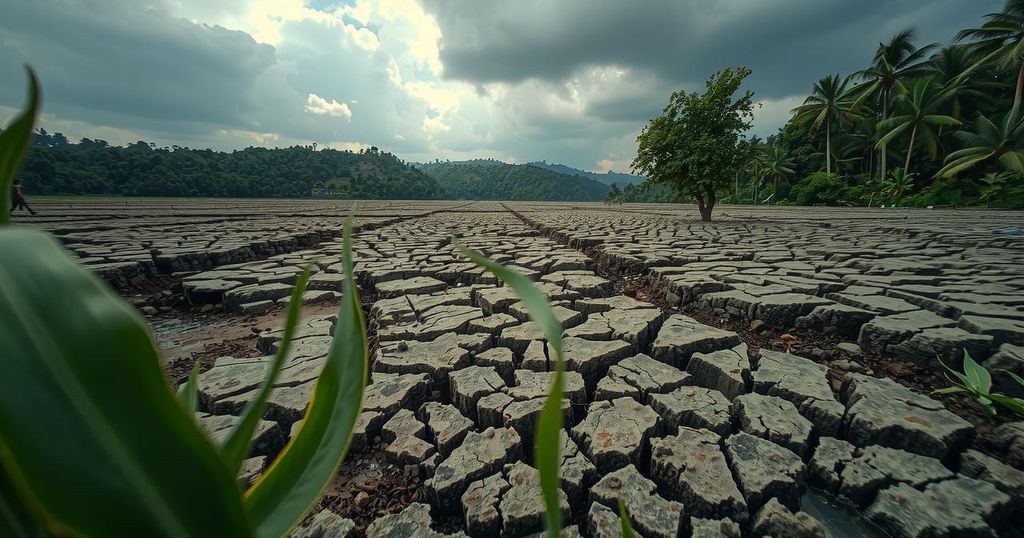World news
AMAZON, ASIA, AZERBAIJAN, BAKU, BE, BRAZIL, CATHERINE RUSSELL, CLIMATE CHANGE, COPERNICUS CLIMATE CHANGE SERVICE, DISASTER RELIEF, EARTH OBSERVATORY, EU, EUROPEAN UNION, FOOD SECURITY, MEXICO, NASA, NASA ’ S EARTH OBSERVATORY, NATURAL DISASTERS, NORTH AMERICA, PHILIPPINES, SOUTH AMERICA, SPACE, UN, UN CHILDREN ’ S FUND, UN UNICEF, UNICEF, UNITED NATIONS, UNITED STATES SPACE
Michael Grant
0 Comments
UN Reports Over 420,000 Children Affected by Amazon Drought Crisis
The UN reports that over 420,000 children in Brazil, Colombia, and Peru are affected by severe drought and water scarcity. UNICEF calls for global leaders to enhance climate financing to address malnutrition and lack of access to basic resources. Recent data reveals alarming closures of schools and clinics due to low river levels, raising concerns for children’s health and education. Despite challenges, there are signs of progress in deforestation reduction efforts in the region.
The recent UN report has revealed that over 420,000 children in the Amazon basin have faced severe water scarcity and drought, primarily in Brazil, Colombia, and Peru. The ongoing drought, which has persisted since the previous year, significantly impacts Indigenous communities and others who depend on boat transportation. UNICEF Executive Director Catherine Russell emphasized that this crisis jeopardizes children’s access to essential resources such as food, water, healthcare, and education. UNICEF underscored the urgency of the situation, urging global leaders at the forthcoming COP29 climate summit in Azerbaijan to significantly enhance climate financing for children. A shortage of food and clean drinking water greatly augments the risk of malnutrition among children and the spread of infectious diseases. Alarmingly, in the Brazilian Amazon alone, low river levels have led to the closure of over 1,700 schools and 760 medical clinics, while Colombia faces similar issues with educational institutions suspending classes due to lack of resources. In light of these developments, UNICEF has requested $10 million in immediate aid to assist affected communities through provision of water and health services. The drought has been attributed to the El Niño phenomenon and worsened by the climate crisis, with implications for deforestation and agricultural stability throughout the region. Despite these challenges, Brazilian Environment Minister Marina Silva expressed optimism, asserting that it is feasible for governments to address climate change effectively. Evidence of progress is reflected in the report indicating a 30 percent reduction in deforestation in Brazil’s Amazon over the past year. Furthermore, Colombia reported an impressive 36 percent reduction in deforestation for 2023, signaling a positive shift in environmental governance in the region.
The Amazon Basin is experiencing a historic drought that has severely impacted local populations, especially children who are among the most vulnerable. Over 420,000 minors are reportedly affected by dangerous levels of water scarcity, resulting in a humanitarian crisis that threatens their health and wellbeing. This predicament is compounded by a lack of adequate access to education, healthcare, and nutritional resources across Brazil, Colombia, and Peru. The UN is calling for concerted global action, specifically increased climate financing dedicated to protecting children amid the escalating climate crisis.
In conclusion, the dire situation in the Amazon basin highlights a pressing humanitarian issue where over 420,000 children are suffering due to extreme drought conditions. UNICEF’s appeal for increased climate financing and immediate financial assistance underscores the urgent need for global action. The intersection of climate change impacts and child welfare must be prioritized to ensure the future well-being of these vulnerable populations.
Original Source: www.aljazeera.com




Post Comment